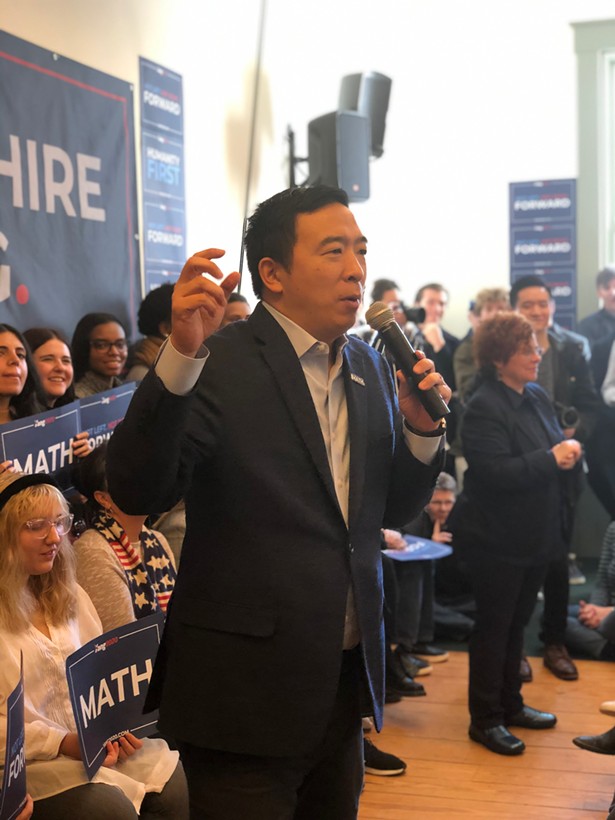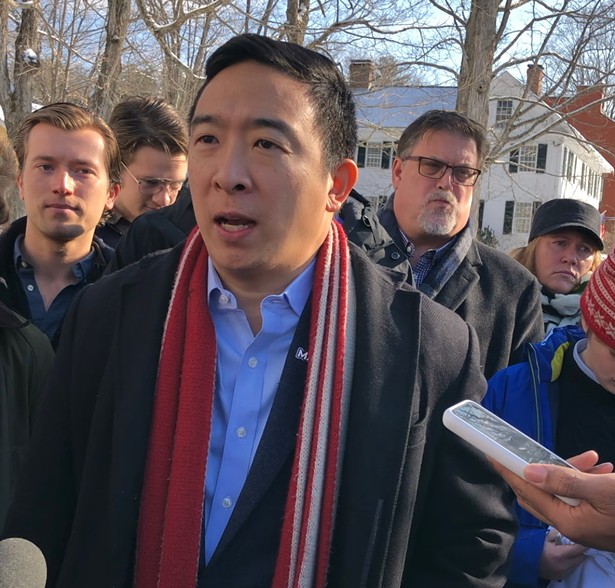HANOVER, NH—There is something different about Andrew Yang. When the tech entrepreneur and Hudson Valley native bounded onto the stage at the Our Rights Our Courts forum in Concord, New Hampshire, on February 8, you could tell that he’s not your average presidential contender. He’s not even your average outsider candidate.
Yang, a part-time New Paltz resident, is seeking the Democratic nomination for president; he was in New Hampshire hoping to nab some delegates in the state’s primary on February 11. Yang is unusual in part because he seems to genuinely enjoy the grueling work of campaigning, showing an uncommon warmth and calmness at his appearances. He cracks jokes, he polls the audience, and he truly speaks his mind.
That last trait landed Yang in a bit of hot water at Our Rights Our Courts, a forum focused on reproductive justice. Though he noted that he’s a pro-choice absolutist, Yang drew heat online and some groans from the audience for breaking from the tone shared by his fellow candidates. “We have to get back to the point where nobody is suggesting that we be celebrating abortion,” he said. “It’s a tragedy, to me, if someone decides they don’t want to have a child.”
An event the following morning in Hopkinton went more smoothly. Yang’s energy on the campaign trail is always high, but it reached a new level in this town of 5,600 people, where he was surrounded by a group of supporters that cut across party lines. Hundreds filled the seats and lined the walls of the Colonial-era town hall, wearing shirts that read Not Left, Not Right, Forward, and hats bearing the word MATH (Make America Think Harder). When Yang entered the room, the place nearly exploded.
Yang is polling around 3 to 4 percent both in New Hampshire and nationally—not nearly enough to win the nomination, but impressive for a candidate who was virtually unknown before his run. That number, and his $16.5 million haul in the last fundraising quarter of 2019, speak to the sheer devotion of his followers.
When you see Andrew Yang in person—when you hear him speak—you start to understand. You get a clearer idea of why a guy whose most recent titles are CEO of a mid-sized test prep company and head of a nonprofit that trains graduates to work for startups has outlasted governors, senators, and congressmen, polling and fundraising like a real (long-shot) contender.
And at a time when both major political parties are historically unpopular and anti-establishment politics are in vogue, Yang’s candidacy has been bolstered by his outsider status. He has benefited from being on the campaign trail for two-plus years without any formal political duties to attend to. But not every anti-establishment candidate catches fire (see: Williamson, Marianne). Yang, it seems, has uniquely resonated, becoming a not-insignificant part of a crowded political conversation.
Yang’s events aren’t centered on scripted speeches or staying on message; they’re freewheeling, frank conversations between the audience and the candidate. He ends many otherwise serious statements with lighthearted quips; his appearances often have the air of a stand-up act rather than a stump speech.
“Phillips Exeter had me back to speak last year and I was honest, I said I hadn’t been back in a long time because I didn’t enjoy my time there,” Yang half-joked to raucous applause.
For their part, the audiences are as loose and friendly as they come. To them, Yang comes across as more of a pal than a candidate. In Hopkinton, the audience had few evident qualms about shouting out responses and declamations. Yang welcomed the interruptions, incorporating them into the dynamic.
Yang asked the audience to call out reasons they’d heard for why Trump won. Russia; emails; sexism; racism; immigration; not a politician. The list went on and on.
He then offered a different explanation. “We eliminated four million manufacturing jobs over the last number of years,” he said. Where were these jobs located? “Ohio, Michigan, Wisconsin, Pennsylvania, Missouri, Iowa: all the swing states Donald Trump needed to win and did win.”
The Road Less Traveled
And yet, Yang’s charisma doesn’t quite explain his improbable presence this far into the race. How did a man with no platform generate an energized national movement?
One explanation: his policy proposals. Yang’s signature idea, a universal basic income (UBI) he calls the “Freedom Dividend,” would overhaul the welfare state and give every American $1,000 per month. It’s a libertarian concept that sets him apart from the other presidential candidates.
Yang has also proposed a public election financing system whereby every voter would get 100 “Democracy Dollars,” which they could spend on candidates of their choosing. This policy, he believes, would curb corruption and reduce the influence of corporate and lobbyist money in elections.
Yang also has ideas about granular issues that are often left by the wayside in presidential elections: automation, artificial intelligence, job training, data privacy. But he has drawn criticism for oversimplifying the economics of UBI, and has gotten pushback from progressive economists who says his proposed value-added tax would be a regressive tax—that is, it would disproportionately impact average taxpayers. These critiques cast doubt on the wonky bona fides of Yang’s platform, though they don’t diminish the fact that his policy prescriptions have resonated with a cross-partisan bloc from disproportionately young, tech-savvy, and libertarian voters.
Who Is Andrew Yang?
Yang, 45, was born in Schenectady to parents who emigrated from Taiwan in the 1960s. His father was a physicist who worked at IBM and General Electric, and his mother was a systems administrator at a local university.
Yang attended the prestigious Phillip Exeter Academy in New Hampshire (a fact he is quick to tout at New Hampshire events) before attending Brown University and Columbia Law School. After graduating, he had a stint at the prestigious New York law firm Davis Polk. He told the Washington Post that his time at the firm was the “the five worst months of my life.”
From there, Yang bounced around between jobs at startups and other businesses—many of which failed, such as a healthcare company that he says “ran out of money”—before landing at Manhattan Prep as a test tutor, eventually working his way up to CEO. He attributes to that job his millionaire status (his net worth is between $700,000 and $2.2 million, according to his FEC financial disclosure).
Yang’s most recent endeavour is Venture for America. The nonprofit’s mission is to create 100,000 jobs by 2025 by training recent graduates to found startups. It has come under scrutiny for having created fewer than 4,000 jobs as of 2019.
On November 6, 2017, just two days before the one-year anniversary of Donald Trump’s election, Yang became one of the first people to file as a 2020 presidential candidate. He was less than an outsider: His destiny at the time was becoming a Wikipedia footnote.
It’s hard to pinpoint where Yang jumped from obscure, random man making a novelty bid for the presidency to tech entrepreneur seriously vying for the office, raising million-dollar sums and polling above the margin of error. He was certainly helped by an interview with well-known podcaster Joe Rogan, which attracted the online following that has propelled Yang to political pseudo-stardom.
Yang has leaned heavily into his persona as the niche candidate of the Internet’s edgier corners. He retweets memes from his followers and adorns his fundraising graphics with a bitmoji of himself. In doing so, he has amassed a slavishly devoted group of followers, the “Yang Gang,” ready to jubilantly defend him and push his message online to anybody who will listen.
But the Yang Gang has a dark side. Like President Trump and fellow outsider Democratic candidate Tulsi Gabbard, Yang has attracted support from racists and white supremacists in online forums like 4chan and Reddit. While it’s unclear how serious his support from right-wing trolls really was, it became a big enough issue that Yang was forced to denounce it.
By last spring, Yang was drawing enormous crowds for an outsider candidate with no prior political experience. He made it into every debate in 2019, even as the increasingly difficult qualifications barred candidates like Cory Booker, Kamala Harris, and Beto O’Rourke.
Somewhere along the way, though, Yang hit a ceiling. By the time February rolled around, emails to supporters were starting to sound the campaign’s death knell. Fundraising was drying up and his polling wasn’t getting beyond low single digits.
The Iowa caucus dealt a serious blow. Yang got 5.2 percent in first alignment votes, a respectable showing, but not enough to be viable in most precincts. He then lost most of his caucus goers in the final alignment, and emerged from the fray in sixth place, with zero delegates to show for more than two years of campaigning.
What’s Next?
Despite Yang’s improbable rise and passionate supporters, he’s all but certain to come up short in New Hampshire on Tuesday. He’ll likely suspend his bid for the White House in due course. Yang started scaling down his campaign after the poor showing in Iowa, firing his national political and policy directors, among more than a hundred other staffers.
The question then becomes: What does the future hold for Andrew Yang? Many have speculated a run for lower office in New York, whether that’s a local or state office, a congressional seat, or even the governorship.
Yang’s run has undoubtedly positioned him well for a run for lower office. He now wields the ability to fundraise off of a massive nationwide fanbase, and he has more than 80 percent national name recognition, on par with Pete Buttigieg and a cut above Amy Klobuchar. His presidential run has even spurred a broader pro-UBI political movement that has spawned its own congressional candidates.
But it seems that Yang is “White House or bust.” Rolling Stone reported Friday that Yang has been telling staffers that a strong performance in New Hampshire, which he defined as 14 or 15 percent, would lay the groundwork to “run this back again in four years.”
Without additional political experience between now and then, it’s hard to see a 2024 presidential run being much more successful than this one. Then again, it wouldn’t be the first time Andrew Yang confounded expectations.
Andrew Solender is a political reporter based in Poughkeepsie. Follow him on Twitter @AndrewSolender.












